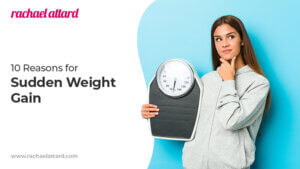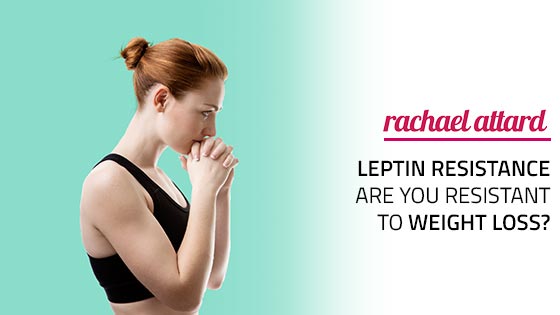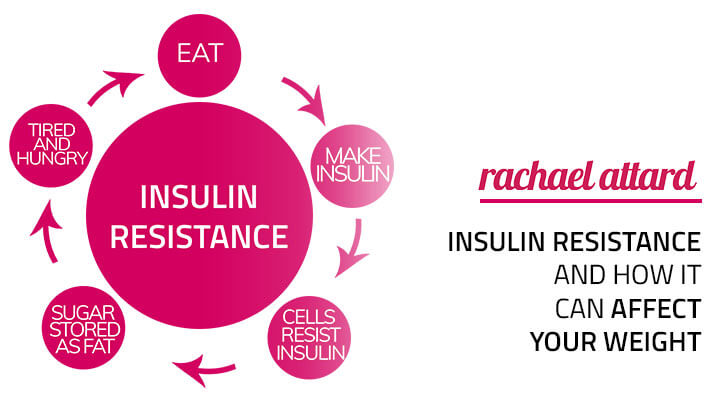PCOS And Weight Loss – Losing Weight With Polycystic Ovarian Syndrome

I’m no stranger to hormone issues and the weight gain that always seems to accompany them. And lately, I’ve gotten a couple of questions about polycystic ovarian syndrome (PCOS) and how to lose weight if you have PCOS.
So here’s what I learned about PCOS and how it can affect your weight.
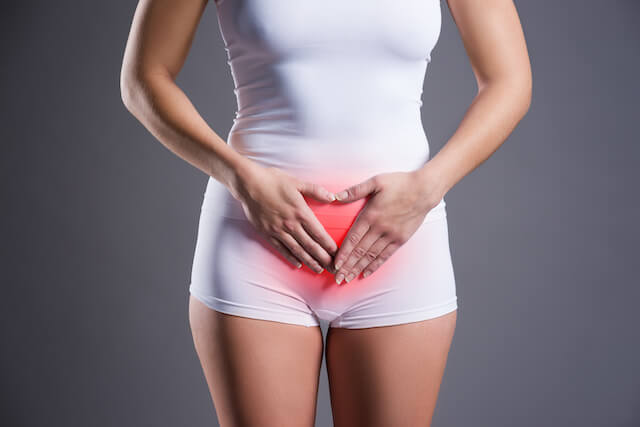
WHAT IS PCOS?
PCOS or polycystic ovary syndrome is a hormone disorder that impacts your ovaries. And it affects a lot of us, about 1 out of every 10 women.
As the name suggests, many women end up developing ovarian cysts.
These cysts can be painful (not endometriosis painful, but you’ll be aware of them), especially around that time of the month.
The syndrome also causes many women to miss their periods or have irregular cycles, making fertility hard to predict. Why? Because PCOS messes with your hormone levels.
It does so by increasing the levels of “male” hormones in the body, such as testosterone.
Androgens (aka male hormones) occur naturally in most women. Our bodies are designed to use both female and “male” hormones to create balance.
But in women with PCOS, those levels will be higher than normal. And the cysts that come with POCS, mess up your estrogen and progesterone levels.
When your hormones are out of balance, you might feel depressed, have infertility problems, see an increase in acne breakouts, and gain weight.
So, is it all due to the cysts? Well, in a way.
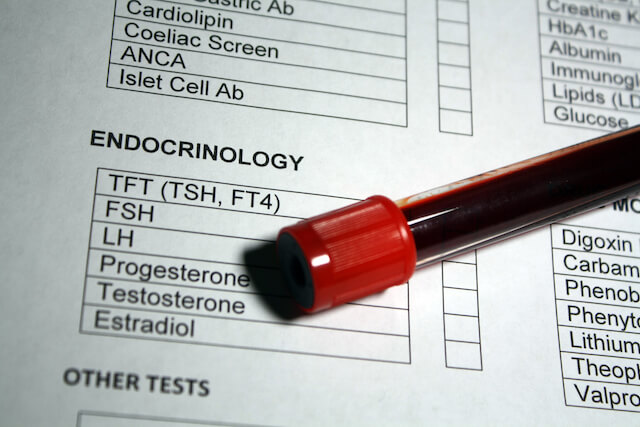
HOW CYSTS CHANGE YOUR SEX HORMONES
The cysts themselves are small sacs filled with fluid. And in each sac, there’s an immature egg. Under normal hormone conditions, those eggs mature and tell your body to start ovulating. But with PCOS, they don’t.
The result is lower than normal levels of progesterone and estrogen and higher levels of male hormones. Sounds imbalanced, right?
WHAT CAUSES IT?
Scientists are still unsure of exactly what causes PCOS.
Genetic predisposition, insulin resistance, and inflammation have all been linked to excess androgen production.
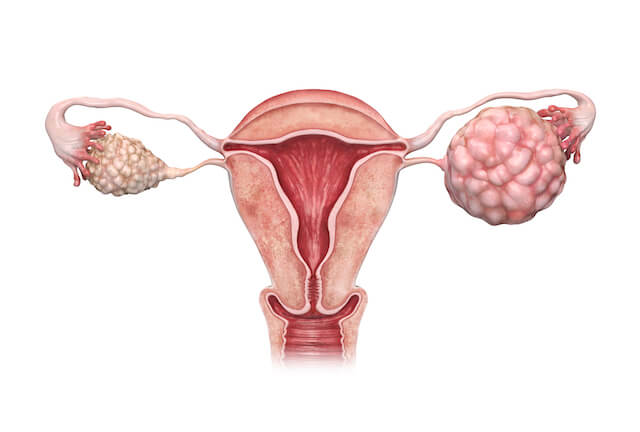
HOW TO TREAT PCOS
Firstly, make sure you get your hormones levels tested by a doctor or naturopath. Personally I’ve had better experience with naturopaths when it comes to hormones, and their testing is more thorough. But integrative doctors (those that combine both medical and natural methods) have by far been the best.
PCOS can be treated with birth control and other medications and hormone supplements. These fill in the gaps that your body is making.
I am more of a fan of balancing hormones in a natural way and finding out what the cause of the problem is, rather than taking fake hormones. But everyone is different and has different preferences on how they want to treat their bodies.
If you do decide on a hormone supplement, try not to rely on it forever. It would be great for your body to be able to start producing the right type of hormones on its own in the future.
There is a lot of information online about how to treat PCOS, but I would definitely go and see a professional first, and get your hormone levels tested.

HOW PCOS MAKES IT DIFFICULT TO LOSE WEIGHT
Doctors usually advise women with PCOS to lose weight since it helps relieve some of the symptoms. But at the same time, PCOS also cause weight gain!
PCOS, like leptin resistance, can make it really hard to shed unwanted weight.
This means, even if you’re doing everything right, eating healthy foods and exercising, the weight might stick around longer than you’d like.
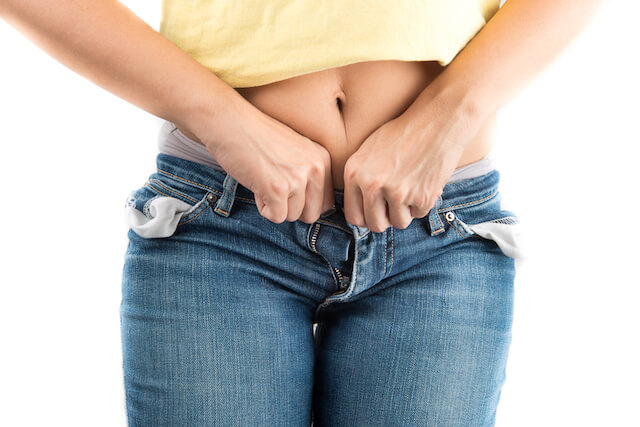
APPETITE/HUNGER HORMONES AND PCOS
I mentioned that PCOS messes up your sex hormone levels. But it seems that PCOS also affects some other hormones.
Your body produces several hormones that regulate hunger and appetite – cholecystokinin, ghrelin and leptin.
And recently scientists discovered that PCOS causes some of those hormones to become imbalanced.
So even if they eat enough, women with PCOS continue to feel hungry.
And the hungrier you are, the more you eat. And the more you eat, the easier it is to put on weight.
RELATED POST: HOW TO REDUCE YOUR APPETITE

PCOS AND INSULIN
POCS also has an effect on how your body produces and uses insulin. Insulin is a very important hormone that regulates your blood sugar.
When everything is working as it should, insulin transports glucose (our main source of fuel) to cells and your body then uses it as energy. Excessive glucose that we don’t use as energy then gets stored as fat.
But a lot of women with PCOS also have insulin resistance which is closely connected with weight gain and obesity.
RELATED POST: THE WORST THING FOR WEIGHT LOSS (THAT YOU DON;T KNOW ABOUT)
HOW TO LOSE WEIGHT WITH PCOS
PCOS puts your body in fat-storage mode rather than fat-burning mode. This means you might put on weight more easily and struggle to get it off.
But there are some things you can do to help your weight loss.
You just have to show a little dedication and determination. And work with your doctor on all major lifestyle changes.
Here are a few ideas to help.
FOODS YOU SHOULD EAT
With all weight loss goals, you need to eliminate processed foods, high-fat treats, and processed sugar.
Eating whole nutrient-rich foods will help your body maintain balance and makes it easier for you to reach that ideal weight. Eat lots and lots of fruit and veggies to get as many nutrients as you can.
LEAN PROTEINS
Lean proteins pack a lot of nutrition without tons of calories. This can make it easier to lose weight over time.
Eating more protein will help you feel more full and for longer. It will slow down your digestion and affects your appetite and hunger hormones in a good way.
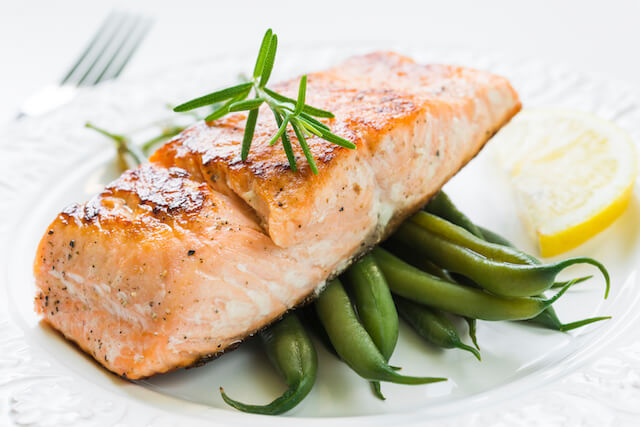
HIGH-FIBER FRUITS AND VEGETABLES
Everyone knows that eating plenty of vegetables and satisfying your sweet tooth with moderate amounts of fruit is always a healthy choice. But with PCOS, it’s even more important.
High-fiber foods may help with keeping blood sugar (and insulin) levels under control which is extremely important for women who also have insulin resistance.
Incorporating these into your diet will also help you feel full for longer.
Try adding broccoli, cauliflower, kale, lettuce, lentils, and squash into your weekly meal plans. If you want a little something sweet, grab a handful of fresh berries or reach for hand-fruits like apples, plums, and peaches.
INTERMITTENT FASTING
Intermittent fasting is the key for balancing insulin and leptin levels. By taking a period of time away from eating, it gives your insulin and leptin levels a chance to drop.
Eating very frequently means that these hormones are constantly being produced to deal with the food coming in. So try
RELATED POST: IS INTERMITTENT FASTING GOOD FOR WEIGHT LOSS
FOODS YOU SHOULD AVOID
For women with PCOS, inflammation can be a major problem. I know inflammation sounds like a very vague word. You can think of inflammation as anything that causes stress to your body – eating an unhealthy diet, overexercising, not getting enough sleep, poor gut health, hormone imbalances and also things like bacteria, viruses and toxins.
Inflammation affects your hormones and weight in a big way. So it’s important to know that you can reduce inflammation when you avoid certain foods. Avoid eating processed or high-sugar items like white bread, starchy potatoes, pasta, and sugar-filled desserts.

EXERCISE IS ESSENTIAL
When you’re not feeling good or are battling inflammation, exercise is probably the last thing on your mind. But when you have PCOS, it should be a major part of your weight loss routine.
The key is to pick something that works for you.
You don’t have to go crazy spending hours at the gym. Instead, focus on getting your heart rate up.
If it’s been a while since you exercised, don’t panic. Walking is a great low-intensity cardio that burns fat.
In addition to cardio, you also might want to focus on resistance training. That doesn’t mean you have to lift heavy weights.
I love doing bodyweight exercises. And if you’re not sure where to start, here you can find some of my bodyweight exercises that are lower intensity.

YOU CAN DO THIS!
PCOS, like any hormone disorder, is a challenge. But it’s one you can handle!
Make an appointment with your doctor. If they try to dismiss your concerns, MAKE YOURSELF HEARD! See a different doctor, or an integrative doctor or naturopath.
Remember, it’s your health and your body. Nobody is going to care about your health like you do. Get the diagnosis you need, and start making changes in your life that will help you overcome the symptoms.
You’ve got this. And PCOS doesn’t have to keep you down!
Love Rachael XX

